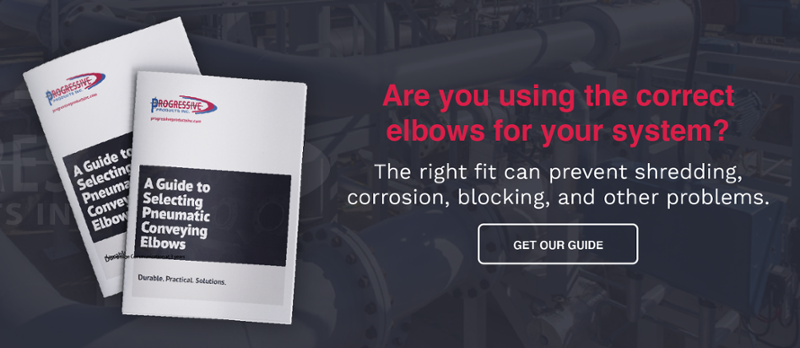It’s highly likely that using the wrong type of elbow, or an elbow that’s made from the wrong type of material for your system, will cause issues. Sometimes abrasion problems are caused by using elbows that simply aren’t made for the task.
For example, if you’re using aluminum elbows and find they wear out quickly, then simply changing them to steel elbows could be your easiest solution. But what are your options, and what are the pros and cons of the different types of material an elbow can be made from?
Pneumatic conveying systems generally use elbows made from aluminum, carbon steel, galvanized steel, and stainless steel. Each has its advantages and disadvantages, and we’ll look at them each in turn.
Aluminum Elbows
Aluminum elbows have several benefits. The main advantages of using aluminum are:
- Corrosion-resistance (it does not rust)
- Lighter than steel
- Quicker and easier to fit and modify
- Easier to fasten with compression couplings (because of its light weight)
Aluminum elbows are also an inexpensive option, so they are often used as a solution for non-abrasive plastics conveying. They are also a great choice for air-only conveying lines.
The disadvantages of aluminum elbows? They have poor durability. Aluminum is light and soft, which means they are a bad choice for abrasive products because they wear easily. They also can be crushed or bent if they aren’t protected during shipping. Moreover, while they don’t contain carbon so they don’t rust, they can be susceptible to certain types of atmospheric or environmental corrosion.
Carbon Steel Elbows
Carbon steel elbows are probably the most ideal elbow in terms of abrasion resistance, and the majority of elbows manufactured and supplied by PPI are made of carbon steel. Carbon steel is 2.5 times denser than aluminum, and it’s much harder. Carbon steel elbows are also:
- Durable – not only are they strong, but they are also very resistant to abrasion
- Economical – carbon steel is strong, so it can be thinner than aluminum piping
- Readily available
- Reasonably priced
A con of carbon steel elbows is their likelihood to rust and they need to be painted if they are in the elements or in a location where rust is a concern.
Galvanized Steel Elbows
Galvanized steel elbows have similar advantages and disadvantages to carbon steel, but they don’t have the same level of corrosion issues.
On the downside, it is labor-intensive and costly to fit or modify galvanized steel elbows. There are certain specification requirements for welding, which makes them more difficult to modify or add components like flanges. Galvanized steel releases a harmful gas so it has to be welded underwater or in a contained environment. While the material costs may be reasonable, you may find that there are additional labor costs which outweigh the savings.
Stainless Steel Elbows
Stainless steel is another commonly used material in pneumatic conveying systems for elbows. It has many advantages, including:
- Corrosion-resistance (no rust or oxidation)
- Being a generally clean material, it is easy to sanitize and is often used in food processing
- Compatibility with many chemicals
However, stainless steel is typically an expensive option because of both the cost of the material and labor. Stainless steel is more labor-intensive to form, weld, and machine. It therefore needs more time and appropriate skills to be able to work with it.
How to Determine the Material your Elbows are Made from
If you need to replace an elbow tube or pipe but don’t know the material it’s made from, there are various ways to test it.
- Stick a magnet to it - if it sticks, it’s carbon steel
- Look at the color - stainless steel is shiny and bright, for example
- Weigh it - steel is very heavy
- Check whether the material is rusty
- Conduct a spark test - sparks give you visual clues as to the material of a metal
- Check the material for imprinting - some materials have what it’s made of stamped on it
With the many pros and cons of different materials for pneumatic conveying elbows, it’s best to talk to an expert. At Progressive Products, we can help you understand which material and which elbows are right for your system. Contact us today.


